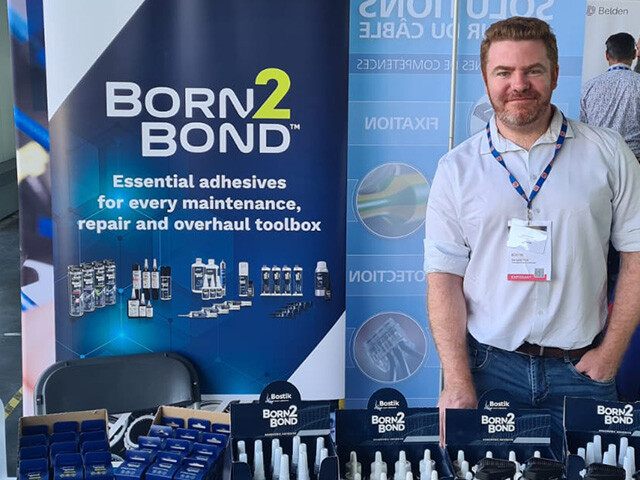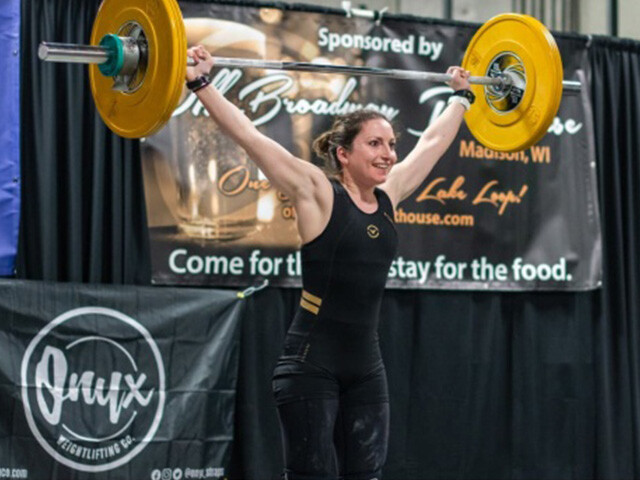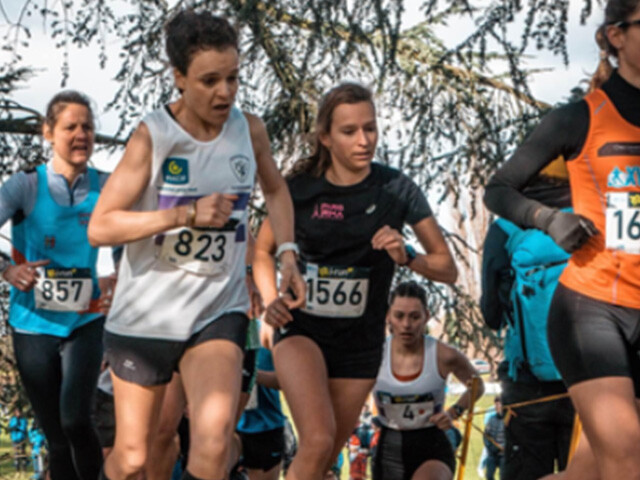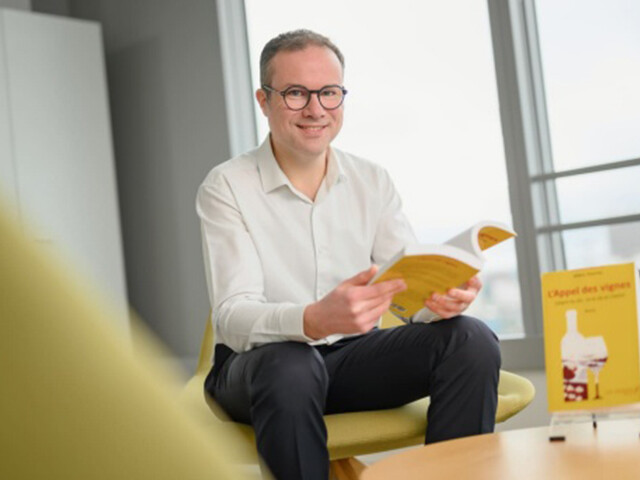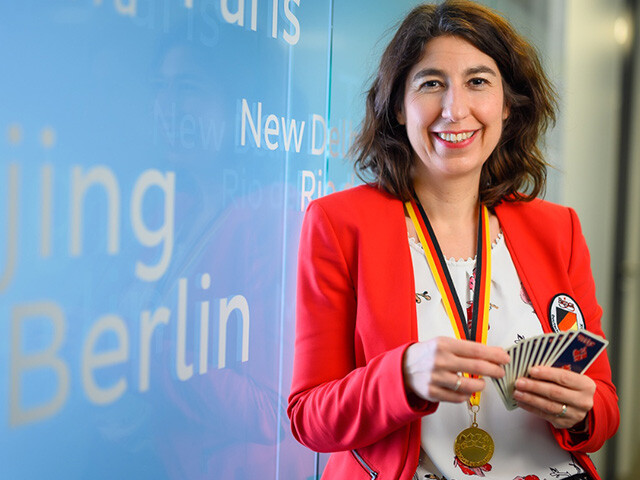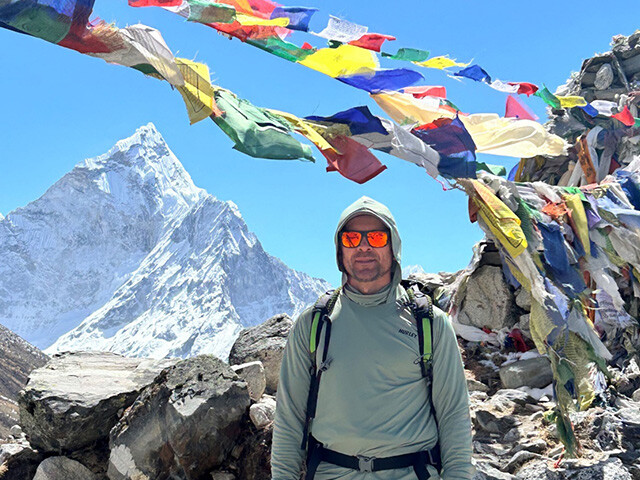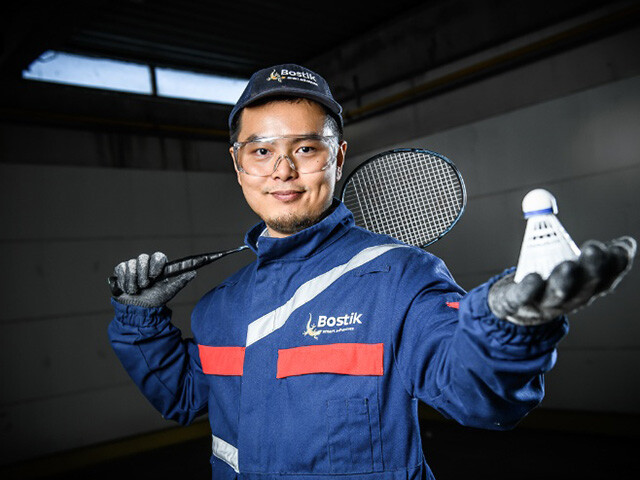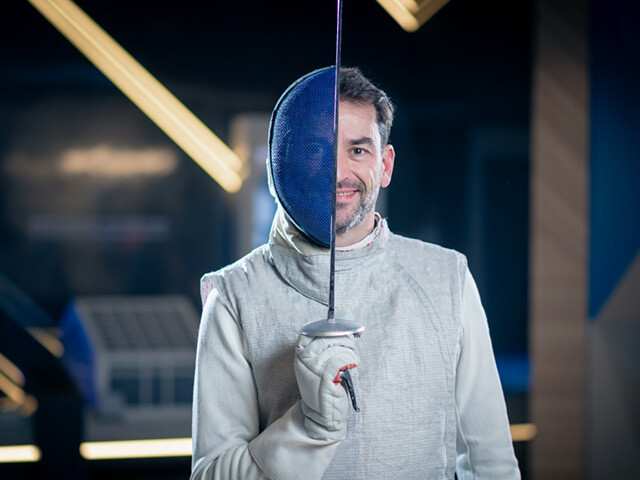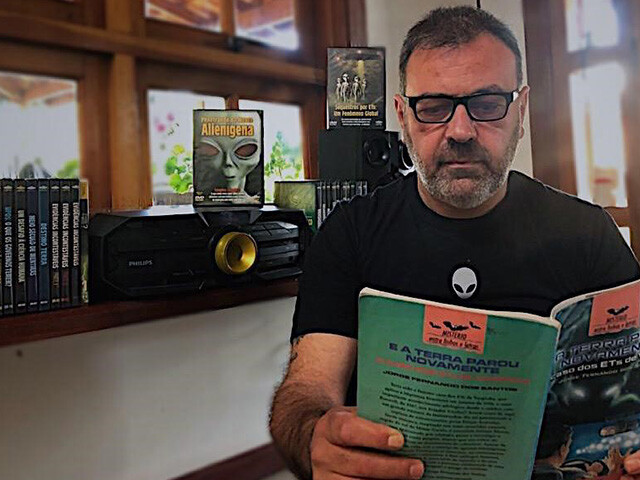From the digital world to the little white ball
What did you study?
Hanitra Karen Raharimanana: After my Bac in Economics and Social Studies, in 2021, I obtained a University Diploma in Sport, Commerce and Services at the IUT Charlemagne in Nancy. This course is specially designed for young top-level athletes. In fact, my sports program had started in secondary school, in year 10, when I joined the Ile-de-France Regional Center for Sports Studies, then the National Training Center in Nancy. After my time in Lorraine, I continued my studies with a University Bachelor of Technology in Marketing Techniques at the IUT of Sceaux, Paris-Saclay University, then specialized in a Bachelor's Degree in E-business Marketing and then a Master's Degree in Digital Marketing on the Nanterre campus near Paris, where I am currently studying.
Was it easy to maintain your athletic profile during your studies?
H. K. R.: I benefited less from my family than other young people my age, but I had the chance to have great experiences and to develop fully. My sport allowed me to discover the four corners of France and to travel for training courses or competitions abroad and in Europe. I got used to having to balance my studies and training. This helped me to acquire a certain capacity for organization and versatility. What became more complicated was that, with the alternating system, the time devoted to my extra-sporting activities intensified a little to the detriment of my training time.
Let's talk about the start of your professional career. Where are you at?
H. K. R.: During my Bachelor's degree, I started working in communications at a skills assessment company, and last year I was in charge of communications for a music label. But I wanted to discover other sectors, and then I came across an offer from Bostik for a work-study contract. I liked the fact that the company was part of a large group like Arkema. I also appreciated the values promoted. Indeed, until then, my professional career had made me realize the importance of working in a human environment where you feel good.
“Bringing the brand's messages to life and engaging consumers through digital communication campaigns.”
What do you like about e-marketing?
H. K. R.: During a sales internship at Quicksilver, a surf and snowboard brand, while studying Sport, Commerce and Services at the IUT in Nancy, I loved discovering the marketing dimension, putting myself in the target's shoes and adapting my speech to the customers, finding methods to better understand their needs, providing solutions, making the brand and its products attractive. I already had the commercial streak and there, I really found my way to specialize. In my personal consumption of social networks, when I scroll through websites, I always have a critical eye, this thing of saying to myself, but why didn't they make that choice instead, highlight that element? I like to say that in life, I have four passions. One is a little more personal but I don't mind talking about it: I am passionate about God! The other three are table tennis, marketing and good humor (laughs).
Specifically, what is your role at Bostik?
H. K. R.: I am in charge of marketing activation and communication for C&C France. We market a wide range of adhesives, floor and wall glues, polyurethane glues, fixing and sealing mastics, etc. We cater for professionals and individuals, particularly with the Sader and Quelyd brands, which keep me very busy.
Overall, my job is to bring to life the messages of the brand, engage consumers, coordinate digital communication campaigns, whether they are sponsored campaigns on social networks, in partnership with the media, or even search engine optimization for product launches. Overall, I am involved in actions and experiences that aim to generate awareness and maximize their impact. I try to add value. In concrete terms, I also create content and posts on social networks. I also write newsletters and e-mail campaigns. For example, I have just written an email addressed to 35,000 architects to promote Wood H910 Silentstik, a high-performance acoustic glue for parquet flooring that benefits from patented Bostik technology. I am also in contact with influencers who will create content for our influencer campaigns. I am also in charge of writing the internal newsletter for C&C France.
Are you satisfied with your first steps at Bostik?
H. K. R.: I really appreciated being immediately involved in a very operational way. At the end of September, just two weeks after my arrival, I was able to participate in Batimat, the international trade show for construction professionals. I wasn't used to this type of event, but my manager trusted and supported me. As a result, I was able to produce several stories, generating a lot of engagement in return. You have to be imaginative without getting distracted. I still need to structure myself and acquire automatic responses to be more efficient in what I do and get to the heart of the matter. It's really a challenge in terms of organization, a balancing act. What I really like is working on a whole range of subjects with different people. They give me a lot of advice, we communicate a lot. I've been here for four months, I've settled in well and I feel that I'm progressing quickly. I've signed up for a year as a work-study student. We'll see what happens next. In the meantime, I'm giving it my all.
Table tennis, a family affair.
When did you first discover table tennis?
H. K. R.: Everyone in my family plays table tennis. Starting with my father, who was champion of Madagascar. I picked up the bat at the age of 8. At 12, I was spotted and invited to join the Île-de-France regional center, which enabled me to progress quickly and be selected for the French team, both individually and as part of a team. Today, I play for Madagascar, which I left at the age of one to go and live in Clamart, near Paris. I am happy and proud to represent the colors of my country of origin.
Does playing table tennis at a high level provide you with an income?
H. K. R.: In France, male professional players can make a living from it. But unfortunately, this is not necessarily the case for many female athletes, who have to work another job at the same time. Personally, it suits me because I prefer to have different interests. Nevertheless, I would like to take advantage of this interview to encourage women not to limit themselves and to pursue their goals despite the challenges they may face!
Do you think your sport gets enough media coverage?
H. K. R.: It didn't get much coverage, but since the Olympic Games in Paris, thanks to the Lebrun brothers, table tennis has been in the spotlight. There are 228,000 licensees to date. The Lebrun effect has boosted their numbers by 25%!
Table tennis players in France were not used to such popularity. As a teenager, I took part in an international competition with Félix Lebrun. At the time, he was good but not as brilliant as he is today. I have seen him develop, which reinforces the idea that anything is possible when you give it your all. Historically, the French are not as good as the Chinese at table tennis. And when Alexis Lebrun beat the world number one, for us it was crazy, something historic. Seeing two young people, who are also such nice brothers, be champions is super inspiring and encouraging.
Table tennis story
Hitting champagne corks with the lids of cigar boxes on a table divided by a row of books! That, according to legend, is how table tennis was born at the end of the 19th century in England, during a social dinner. More seriously, the “whiff-whaff” as it was called across the Channel, was then played by Victorian high society as a variant of tennis, played indoors during the winter. In 1901, the British company J. Jaques & Son launched “a new table tennis game”. The ball, initially made of rubber or cork, was made of celluloid before increasing in diameter from 38 to 40 millimeters and is now made of ABS plastic. From wooden rackets initially covered with sheepskin, in the 1960s we moved on to rubber or foam pimpled surfaces, with the use of foam pads to increase the speed and spin of the ball. Today, table tennis is a universal sport, accessible to everyone. In France, it is estimated that 30% of single-family homes have a ping-pong table! The first official table tennis championship was held in Berlin in 1928. The discipline was included in the Olympic Games in 1988.
“We're a long way from camping table tennis!”
How do you train?
H. K. R.: When I was younger, in the Sports-Studies section, I trained twice a day every day, or almost every day. Today, with classes at university and work-study programs at Bostik, I devote four or five two-hour sessions a week to my club in Saint-Denis in the Paris suburbs. This is really the minimum necessary to perform at a high level. So I try to optimize my training time. There is a lot of physical and mental preparation involved. I try to feel my best, to work more efficiently, to keep fit by doing jogging in particular.
Is it a demanding sport?
H. K. R.: Table tennis is super fast, it's super technical! According to the rules, a table tennis table is 274 cm long and 152.5 cm wide. That's not much compared to a tennis court (23.77 m by 8.23 m) but the effort is intense. To win, you have to be a real athlete. What I like about this sport is its technical, physical, mental and strategic dimensions at the same time. That's what makes it so difficult to master. It's a far cry from camping ping-pong! Whereas, for example, the average speed of a ball during a rally is between 20 and 30 km/h for an amateur player, it can exceed 100 km/h for a professional during a smash.
By not getting out of breath so quickly, you can last longer in exchanges and have more explosive power in your strokes. That's why I do weight training, core strengthening, maximal aerobic speed (MAS) and coordination. Personally, I love the strategic aspect of trapping your opponent and finding his or her weaknesses. The duel aspect is very pronounced and requires a lot of concentration and thought to get the better of your opponent, a bit like in chess. It's also very technical. Precision and control of spin are crucial. For example, tilting your racket too much, by just a few degrees, sends the ball into the net or off the table depending on the spin. There are so many criteria to take into account. The mind is what allows you to come through in big matches and win titles. With confidence, you can beat a stronger player, make up for a big difference in level. When you feel good, when you feel good in your head, you can move mountains. On the contrary, when confidence is lacking, when you go from defeat to defeat, it's very hard. It's part of the evolution to know how to hang on in difficult times to scrape together victories and get back on track.
“I'm aiming to qualify for the 2028 Olympic Games in Los Angeles.”
Do you ever play with colleagues?
H. K. R.: Yes, especially with Keyvan Sabouri, Export and New Business Manager at Bostik, who played table tennis for several years in a club. We sometimes meet up at the table at the Campus* (Colombes, France) at the end of the day to unwind.
*the interview was conducted at the Colombes Campus before the Arkema headquarters moved.
What are your goals?
H. K. R.: My world ranking this year has allowed me to qualify directly for the World Championships in Doha, Qatar, from May 17 to 25. It will be my first time participating in such a major event! I am also aiming to qualify for the 2028 Olympic Games in Los Angeles. In the meantime, I will try to win medals at the African Games in three years' time and during the African Cup and African Championships, which take place every year.
And your fondest memories?
H. K. R.: In 2014, when I was named French junior champion in doubles with Amélie Pauly Prost. It was my first national medal and in the most beautiful of colors! Another great moment was my victory in the Six Nations Tournament in 2016, the first international competition I won with France, both in singles and in team events. And another of my proudest moments is having won the title of East African champion in 2023, playing for Madagascar, and repeating the feat in 2024! It's true that individually, there is the extremely rewarding aspect of telling yourself that you don't depend on anyone and that it's your personal efforts that have paid off. But in a team or doubles, there is this very strong feeling of seeing that we have achieved something together. That's the strength of the collective. Exactly like at work.

